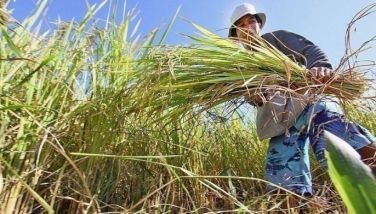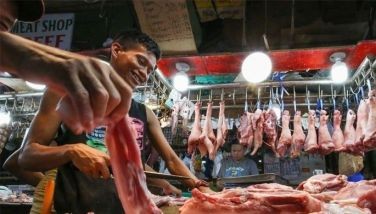The long hike down
MANILA, Philippines - Every Friday, Nora Virtudez passes through 12 small rivers across the mountainous terrain of Rodriguez, Rizal to bring her family’s weekly harvest of various agricultural produce to the St. Vincent church in Tandang Sora, Quezon City.
Aling Nora, a mother of 10, is among the seven Dumagat families of Barangay Puray who regularly brave the heat of the sun and the long hike every week to haul their sack-fuls of gabi, ubi, camote, cassava, saba, ginger, tomatoes, as well as in-season fruits, down to the city.
Come Saturday and Sunday, a spread of fresh green vegetables such as pechay, sitao and eggplant, root crops, fruits, and other commodities cover a part of the churchyard where consumers delight themselves with fresh and low-priced produce.
Maswerte po kami, kasi meron na kami ngayong regular na pinagdadalhan ng aming mga produkto,” Aling Nora said. (We are lucky because we have a regular place where we can bring our produce.)
The stalls are provided, free of charge, by the Agribusiness and Marketing Assistance Service (AMAS) of the Department of Agriculture (DA).
Prior to this, the Dumagats were forced to sell their commodities by bulk at very low prices. Evidently, this does not compensate the hard labor their tired bodies bear, going to and from the mountains week after week.
Dati-rati binibili ng pakyawan sa mga palengke ang aming paninda, buti ngayon, mas malaki na ang aming kita dahil di na namin ibinebenta ng bulto,” she adds. (Before market traders buy our goods on a wholesale basis, it’s a good thing now that we are able to earn more because we don’t sell by the bulk anymore.)
The DA also provides transport services from the Montalban Plaza where the produce are collected. With this, the Dumagat farmers are spared from the high cost of transport.
“Napakalaki po ng pasasalamat namin sa tulong ni Sec. Procy Alcala ng DA at ni AMAS director Leandro Gazmin, dahil malaki ang natitipid namin ngayon,” Aling Nora explains. (We are very grateful to the assistance of DA Sec. Procy Alcala and AMAS director Leandro Gazmin, because we are able to save a lot now.)
However, traveling from their community to the plaza remains a burden as farmers still pay a habal-habal—a local transport system suited for the rugged mountains—P64 per sack of any commodity and P60 per person per trip.
“Kung pwede po kaming humiling ng tramline dun sa aming lugar para mas madali kaming makapagdala ng mga produkto mula sa bundok,” she adds. (If we could request for a tramline system so we may be able to bring our products from the mountains.)
And so Aling Nora and the rest of the Dumagat farmers are once again seeking DA assistance, this time for a tramline system that is sure to make their lives a whole lot better.
The system is a fast, easy, and affordable means to transport produce from the highlands. Based on the data of the Philippine Center for Post Harvest Development and Mechanization or PhilMECH, this efficient technology lessens hauling costs by 60 percent and transport time from hours to mere minutes.
Once the Dumagats have access to a tramline system, more fresh produce can be hauled from the mountains to the QC plains in a short span of time allowing the farmers to trade on a daily basis and bring home bigger profits.
But for now, they will continue to plant, harvest and transport various agricultural produce through 12 small rivers across the mountainous terrain of Rodriguez, Rizal every week.
(Note: Alongside DA, the Agri-Aqua Network International, Inc. also supports the Dumagat farmers by providing technical know-hows and expertise for organic farming.)
- Latest






























